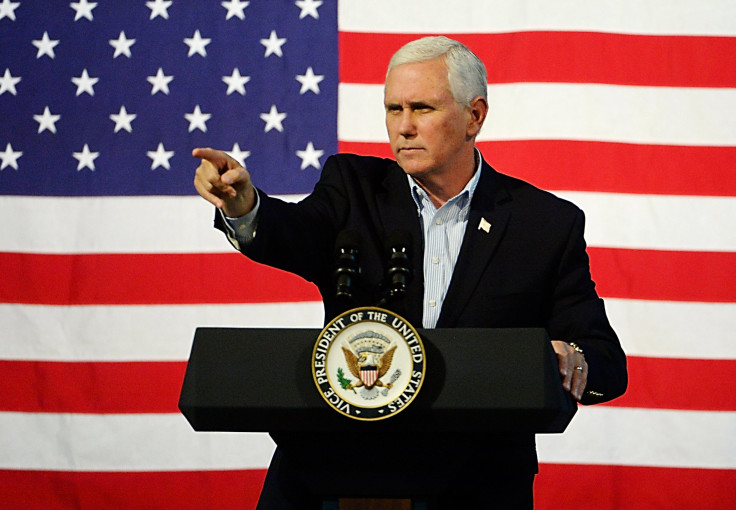Trump Jokes About Pence Hanging Gay People: History Of VP's Anti-LGBT Stance

In a profile published by the New Yorker on Vice President Mike Pence, it was revealed that President Donald Trump joked that his running mate wanted to hang all gay men.
Reporter Jane Mayer reported a meeting that took place between the president, vice president and an unnamed legal scholar, where Trump reportedly said that no one should ask Pence about gay rights. "Don’t ask that guy — he wants to hang them all!" Trump joked, the article reported.
While it cannot be confirmed whether such a meeting ever took place or whether Pence ever made such a disparaging comment about the LGBT community, there is no denying that the vice president has never openly supported gay rights as part of his political agenda.
The CEO of GLAAD Sarah Kate Ellis tweeted the following statement after the report in the New Yorker was published:
Deeply disturbing and dangerous, sadly no longer shocking https://t.co/rtRn0UsNk9
— Sarah Kate Ellis (@sarahkateellis) October 16, 2017
Here is a look back at five times Pence stood against the LGBT community:
Opposing Anti-Discriminatory Laws Against the LGBT Community
Although Pence did not make hard-hitting statements regarding his views on the LGBT community during the 2016 election campaign, he made his stance on the particular subject more than clear during his previous attempt to run for presidential office.
"Congress should oppose any effort to recognize homosexual’s [sic] as a 'discreet and insular minority' entitled to the protection of anti-discrimination laws similar to those extended to women and ethnic minorities," his 2000 election campaign website said.
Standing Against Marriage Equality
Pence has never stood for marriage equality in the United States. When the Federal Marriage Amendment was introduced in 2003, Pence was one of the people who signed it, knowing well that the bill categorically restricts the institution of marriage to something that takes place solely between a man and a woman.
In addition to that, his 2000 campaign website stated: "Congress should oppose any effort to put gay and lesbian relationships on an equal legal status with heterosexual marriage."
Supporting "Don’t Ask, Don’t Tell" Policy
The "Don’t Ask, Don’t tell" policy, implemented under the directive of former President Bill Clinton in 1994, was controversial because it let people from the LGBT community serve in the U.S. military as long as these people did not discuss their sexual orientation or engage in sexual activity with their fellow soldiers.
When the policy was finally repealed by former President Barack Obama, Pence wasn’t happy about it. "As a conservative, I have a particular worldview about moral issues," Pence admitted on the House floor at the time.
He elaborated on his views on the matter in an interview with CNN later. "We ought not to use the American military as a backdrop for social experimentation," he said.
"Homosexuality is incompatible with military service because the presence of homosexuals in the ranks weakens unit cohesion," according to Pence's 2000 campaign website.
Opposing Transgender Bathroom Directive
Pence also opposed the federal directive passed by Obama last year that required public schools to allow students to use bathrooms corresponding with their gender identity, not the gender assigned to them at birth. "The federal government has no business getting involved in issues of this nature," Pence said in a statement at the time.
Supporting "Gay Conversion Therapy"
Although his spokesman Marc Lotter told the New York Times during the 2016 campaign that Pence does not support "gay conversion therapy," a statement from his 2000 campaign website has often been interpreted as the vice president extending his support for the highly controversial practice.
"Congress should support the reauthorization of the Ryan White Care Act only after completion of an audit to ensure that federal dollars were no longer being given to organizations that celebrate and encourage the types of behaviors that facilitate the spreading of the HIV virus," stated the website. "Resources should be directed toward those institutions which provide assistance to those seeking to change their sexual behavior," it added.
© Copyright IBTimes 2024. All rights reserved.












